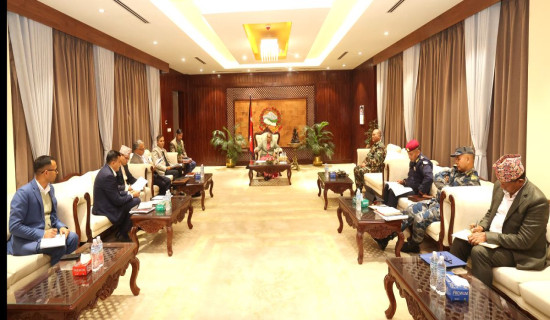- Wednesday, 25 February 2026
Festive Togetherness
The Teej festival has long been a symbol of marital devotion, where women fast for the well-being and longevity of their husbands. The festival evokes images of married women adorned in bright red saris with bangles, vermillion, and beaded necklaces, observing a strict fast, which has traditionally been seen as an expression of a wife's love and sacrifice. However, in recent years, Teej has begun to embrace a more inclusive spirit, reflecting the feeling of togetherness between husband, wife and beloved persons.
Traditionally, Teej has been a women’s festival, focussing on the wife’s role in praying and worshipping Lord Shiva for her husband’s health and longevity. Often unmarried women also fast in hope of getting a loving and respectful husband. While women mark their fast by wearing red saris and dancing and singing together, men observe the fast quietly, without outwardly displaying their participation. A growing number of men have lately started to participate in fast, breaking away from the conventional understanding of gender roles within the festival. This shift is more than just a superficial change; it represents a recognition of mutual respect and equality in marital relationships.
Critics may argue that men’s participation in Teej undermines the traditional values of the festival. However, the essence of the celebration is love, sacrifice, and the well-being of one’s partner. If a husband joins his wife in fasting, he is not undermining the festival’s importance but rather is helping to enhance shared commitment to each other’s well-being and happiness. The changing practices of men breaking the outdated notion that only women should bear the burden of sacrifice in a marital relationship have positive impact in social reforms.
The act of fasting together as a soulmate symbolises a partnership built on mutual respect and equality. In a society where gender roles are still rigidly defined, this emerging trend is a small but significant step towards a more egalitarian aspect of marriage. It sends a powerful message that the health and happiness of both partners are equally valued and both should be willing to make sacrifices for the other.
It also challenges the stigma often associated with men who choose to engage in activities reserved for women only. Such changes help in fostering a more inclusive society where traditions are respected. Culturists emphasise that it will be beneficial for both husband and wife if they fast together and perform worships together. The positive vibe they generate after prayers would lead to their happy life. Moreover, men’s involvement in Teej fasting underscores the importance of empathy in relationships. It shares the joy, pain, happiness, and sadness they both experience while staying together and making a family.
The shared experience strengthens the bond between partners, making their relationship more blissful and harmonious. As men join the fast with women, they pave the way to create a more just, equitable, and inclusive society. The participation of men in Teej should be welcomed as a positive development as it bolsters up the core values of love, sacrifice, and mutual respect that the festival embodies.
















-original-thumb.jpg)
